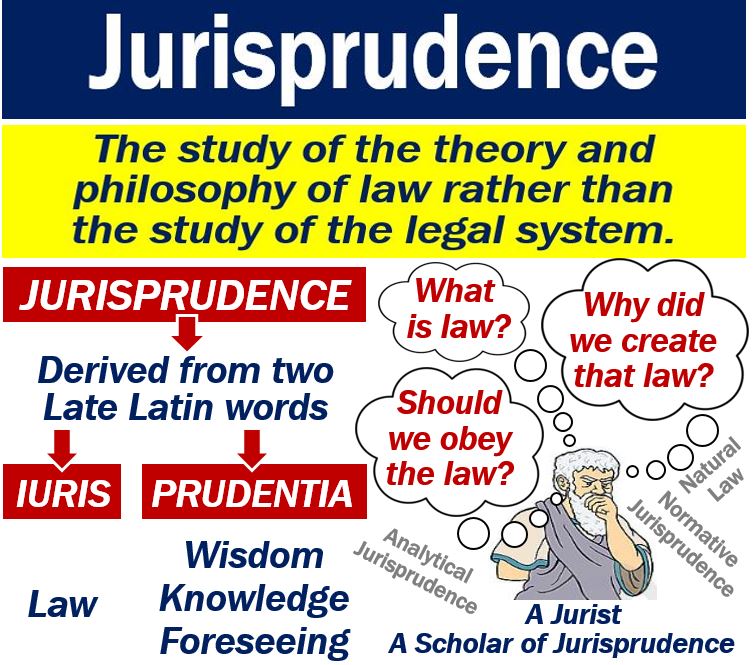Jurisprudence or Legal Theory is the philosophy of law, i.e., the science of law. It is the study of the theories and principles on which a legal system is founded. Jurisprudence is the science. The term may also refer to a department of law, as in ‘medical jurisprudence.’
There are several different types and schools of jurisprudence. Some treat the subject like science or math. Others, however, take a different approach.
Wikipedia makes the following comment regarding the meaning of the term:
“Jurisprudence or legal theory is the theoretical study of law, principally by philosophers but, from the twentieth century, also by social scientists.”
Jurist vs. juror
We refer to scholars of legal theory as legal theorists or jurists. Do not confuse jurist with jurors, who are members of a jury in a court of law.
Jurists aim to gain a deeper understanding of the role that law plays in society. Jurists also strive to better understand legal reasoning, legal institutions, and legal systems.
Furthermore, jurists contribute to legal developments by anticipating future challenges and exploring how existing laws might evolve to address them.

Etymology of jurisprudence
Etymology is the study of the history and origin of words, and also how their meanings and structures have evolved. Somebody who specializes in etymology is an etymologist.
The term first emerged in the English language in the 1620s with the meaning a ‘systematic knowledge of law.’ It came from the French word Jurisprudence.
The French word came directly from Late Latin Iurisprudentia, which means ‘the science of law.’ ‘Iuris’ meant ‘of right, of law,’ while ‘prudentia’ meant ‘knowledge, a foreseeing.’
It was not until 1756 that people used the English word with the meaning ‘philosophy of law.’
Jurisprudence – main aspects
-
Four main aspects
There are many aspects to the study of the philosophy of law. However, according to Cornell Law School, four of them stand out:
– This is where jurists seek to analyze, explain, and classify whole bodies of law. They also examine it carefully and criticize it. This is the form of jurisprudence with the greatest prevalence.
Legal encyclopedias and law school textbooks represent this kind of scholarship.
– This type of legal theory contrasts and compares law with social sciences and literature. It also compares law with economics and other fields of knowledge.
– There is also a type that seeks to reveal where a particular legal concept came from. Scholars look at it historically and also try to find cultural and moral connections.
– According to Cornell Law School: “This body of jurisprudence focuses on finding the answer to such abstract questions as ‘What is law?‘ and ‘How do judges (properly) decide cases?'”
-
Three main aspects
KidzSearch says that today there are three main aspects with which scholarly writing engages:
Natural Law
Natural law is the notion that some laws that govern us are unchangeable. Therefore, institutions should make sure that our institutions match these laws.
Analytical jurisprudence
This aspect includes questions such as “What is law?” or “What is the relationship between morality and law?” In other words, questions that legal philosophers might ask regarding the law.
Normative jurisprudence
This aspect overlaps with political and moral philosophy. It asks what law should be like. Should we obey the law? How should we punish law breakers and on what grounds? It also includes the proper limits we should have and uses of regulation.
When we precede a field of study with the word ‘normative,’ it usually means looking at how things should be. For example, normative economics is all about value judgments, i.e., how things should be or should have been.
Compound phrases with “jurisprudence”
A compound phrase is a term that consists of two or more words. Here are five widely used compound phrases containing the word “jurisprudence,” along with their definitions and examples:
-
Legal Jurisprudence
The study and theory of law, focused on analyzing and understanding the nature, sources, and purpose of legal systems.
For example: “The judge’s decision was heavily influenced by his understanding of legal jurisprudence, which emphasizes the importance of precedent in guiding judicial decisions.”
-
Constitutional Jurisprudence
This pertains to the principles and theories related to the interpretation and application of a country’s constitution.
For example: “The Supreme Court’s ruling on this matter will become a significant part of American constitutional jurisprudence.”
-
Comparative Jurisprudence
A field of study that examines the similarities and differences between the laws of different countries or cultures.
For example: “Her thesis on comparative jurisprudence provided an in-depth analysis of how different legal systems approach human rights.”
-
Philosophical Jurisprudence
An aspect of jurisprudence that deals with the philosophical or ethical questions pertaining to law and legal systems.
For example: “Philosophical jurisprudence raises fundamental questions about the very nature of law and justice.”
-
Normative Jurisprudence
The study of what the law ought to be, encompassing the exploration of legal ethics and the moral foundations of legal systems.
For example: “Normative jurisprudence often challenges the status quo by asking whether current laws serve the greater good of society.”
Jurisprudence quote by a famous person
“I have, alas! Philosophy, Medicine, Jurisprudence too, And to my cost Theology, With ardent labor, studied through. And here I stand, with all my lore, Poor fool, no wiser than before.”
Johann Wolfgang von Goethe (1749-1832. He is widely regarded as the greatest and most influential writer in the German language)
Video – What is Jurisprudence?
This video, from our YouTube partner channel – Marketing Business Network, explains what ‘Jurisprudence’ means using simple and easy-to-understand language and examples.
Interesting related article: “What is a Lawyer?“
